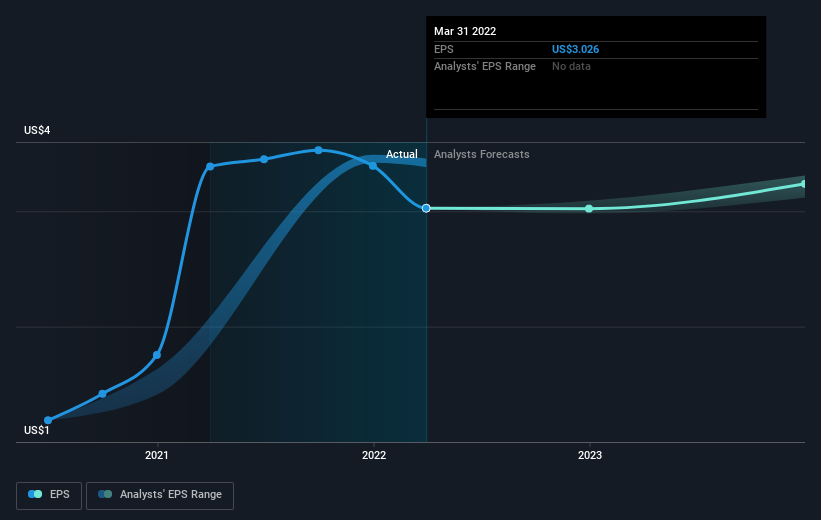The past year for Premier Financial (NASDAQ:PFC) investors has not been profitable
It's normal to be annoyed when stock you own has a declining share price. But often it is not a reflection of the fundamental business performance. The Premier Financial Corp. (NASDAQ:PFC) is down 13% over a year, but the total shareholder return is -9.4% once you include the dividend. And that total return actually beats the market decline of 17%. Longer term shareholders haven't suffered as badly, since the stock is down a comparatively less painful 9.9% in three years. It's down 17% in about a quarter. However, one could argue that the price has been influenced by the general market, which is down 15% in the same timeframe.
So let's have a look and see if the longer term performance of the company has been in line with the underlying business' progress.
Check out our latest analysis for Premier Financial
To quote Buffett, 'Ships will sail around the world but the Flat Earth Society will flourish. There will continue to be wide discrepancies between price and value in the marketplace...' One imperfect but simple way to consider how the market perception of a company has shifted is to compare the change in the earnings per share (EPS) with the share price movement.
Unhappily, Premier Financial had to report a 11% decline in EPS over the last year. This proportional reduction in earnings per share isn't far from the 13% decrease in the share price. Therefore one could posit that the market has not become more concerned about the company, despite the lower EPS. Rather, the share price is remains a similar multiple of the EPS, suggesting the outlook remains the same.
The graphic below depicts how EPS has changed over time (unveil the exact values by clicking on the image).
We're pleased to report that the CEO is remunerated more modestly than most CEOs at similarly capitalized companies. But while CEO remuneration is always worth checking, the really important question is whether the company can grow earnings going forward. This free interactive report on Premier Financial's earnings, revenue and cash flow is a great place to start, if you want to investigate the stock further.
What About Dividends?
As well as measuring the share price return, investors should also consider the total shareholder return (TSR). The TSR is a return calculation that accounts for the value of cash dividends (assuming that any dividend received was reinvested) and the calculated value of any discounted capital raisings and spin-offs. It's fair to say that the TSR gives a more complete picture for stocks that pay a dividend. In the case of Premier Financial, it has a TSR of -9.4% for the last 1 year. That exceeds its share price return that we previously mentioned. And there's no prize for guessing that the dividend payments largely explain the divergence!
A Different Perspective
While it's certainly disappointing to see that Premier Financial shares lost 9.4% throughout the year, that wasn't as bad as the market loss of 17%. Longer term investors wouldn't be so upset, since they would have made 3%, each year, over five years. In the best case scenario the last year is just a temporary blip on the journey to a brighter future. If you would like to research Premier Financial in more detail then you might want to take a look at whether insiders have been buying or selling shares in the company.
If you are like me, then you will not want to miss this free list of growing companies that insiders are buying.
Please note, the market returns quoted in this article reflect the market weighted average returns of stocks that currently trade on US exchanges.
Have feedback on this article? Concerned about the content? Get in touch with us directly. Alternatively, email editorial-team (at) simplywallst.com.
This article by Simply Wall St is general in nature. We provide commentary based on historical data and analyst forecasts only using an unbiased methodology and our articles are not intended to be financial advice. It does not constitute a recommendation to buy or sell any stock, and does not take account of your objectives, or your financial situation. We aim to bring you long-term focused analysis driven by fundamental data. Note that our analysis may not factor in the latest price-sensitive company announcements or qualitative material. Simply Wall St has no position in any stocks mentioned.

